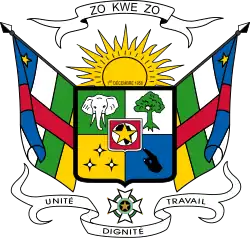| ||||||||||||||||||||||
| Results | ||||||||||||||||||||||
|---|---|---|---|---|---|---|---|---|---|---|---|---|---|---|---|---|---|---|---|---|---|---|
| ||||||||||||||||||||||
 |
|---|
|
|
A constitutional referendum was held in the Central African Republic on 1 February 1981, following the overthrow of Jean-Bédel Bokassa in 1979. The new constitution would make the country a presidential republic with a unicameral National Assembly, as well as restoring multi-party democracy for the first time since 1962.[1] It was approved by 98.55% of voters with a 92.53% turnout.[2]
Following the referendum, presidential elections were held on 15 March. However, a military coup occurred on 1 September, before parliamentary elections could take place.
Results
| Choice | Votes | % |
|---|---|---|
| For | 837,410 | 98.55 |
| Against | 12,360 | 1.45 |
| Invalid/blank votes | 9,463 | – |
| Total | 859,447 | 100 |
| Registered voters/turnout | 928,800 | 92.53 |
| Source: African Elections Database | ||
References
- ↑ Elections in the Central African Republic African Elections Database
- ↑ CAR: 1981 Constitutional referendum EISA
This article is issued from Wikipedia. The text is licensed under Creative Commons - Attribution - Sharealike. Additional terms may apply for the media files.